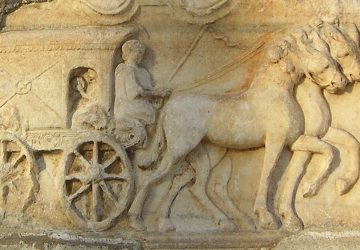Journeys Through Time: Uncovering the Ancient Secrets of Global Exploration
Contrary to the belief that travel is a modern undertaking ushered in by the advent of the car and the airplane, it is actually an activity with ancient origins. From time immemorial, humans have indulged in travel for leisure, not dissimilar to the way we do today. The Far East shows evidence of straying beyond familiar territory for the dual purpose of discovery and cultural enrichment. The citizens of Ancient Rome, similarly, would retreat to summer residences akin to our contemporary Mediterranean villas, demonstrating even centuries ago the value in allocating resources for recreational escapes and pursuing paths untrodden.

Leisure Travel in Antiquity
The Roman Empire was ahead of its time when it came to recreation-based travel. Roman citizens often owned lavish summer retreats designed for relaxation and social activities. To facilitate the journey to these destinations, the Romans engineered an extensive network of roads. While not the first civilization to construct roads, their methodology was exceptional, allowing for safe and expedient travel across great expanses. These roads were so robustly built that remnants are still in use today, enduring under the weight of modern vehicles.
Middle Ages Pilgrimages
Contrary to what is often portrayed, the Middle Ages were not devoid of travel opportunities, despite a less developed infrastructure. Unlike their Roman predecessors, the individuals of this era embarked on journeys predominantly for religious reasons—pilgrimages. Given the era's deeply religious context, it’s unsurprising that pilgrimages were a common form of travel. The pilgrimage to the Spanish site of Santiago de Compostela is one among many that people still undertake today. Although these pilgrimages were arduous and fraught with peril, they were fervently undertaken by thousands, traversing immense distances to seek spiritual solace at revered sites. Nobility often journeyed via waterways or with caravans, while commoners generally went by foot, camping or lodging affordably along the way. Today, these ancient routes crisscross Europe, marked by the distinctive scallop emblem signaling the path to historically significant churches founded in the pre-electric age.
Cultural Tours and Grand Travel
As time marched forward to the 17th century, travel underwent yet another transformation with the rise of the Grand Tour—a rite of passage for Europe's young elite. This trend in travel consisted of extended trips through major European cities for cultural and educational enrichment. Unlike today’s digital learning environments, these journeys offered immersive lessons in architecture, art, and history, enhanced by the guidance of knowledgeable tutors. One notable traveler of the era, Peter the Great, was so influenced by his explorations in Western Europe that they inspired elements of Saint Petersburg's design, mirroring Amsterdam and other Dutch cities. The Grand Tour exemplified how travel could act as a conduit for cultural exchange and inspiration.
The Railway Revolution and the Birth of Modern Tourism
The establishment of the railway system in the 19th century revolutionized travel, making it a more accessible and affordable endeavor, extending beyond the upper echelons of society. It marked the dawn of contemporary tourism and catalyzed the creation of associated businesses. Thomas Cook, a visionary entrepreneur, founded England's first travel agency, capitalizing on the burgeoning train network and accommodation sector to assemble organized group excursions.
Travel Today: Quantum Leaps and Considerations
From the epoch of lengthy sea voyages to today's swift air travel, the evolution of transportation has accelerated travel accessibility like never before. Whereas once ships would spend many months at sea, now a day's flight can place travelers on distant continents. Such ease often comes with the requirement of financial planning, yet it is a price many deem worth paying for the enriching experiences obtained through travel. However, the rise in mobility has birthed a phenomenon known as over-tourism, with substantial repercussions for destinations' native ecosystems and populations. While the pursuit of knowledge and exploration through travel is a noble endeavor, it is crucial to traverse the globe with respect, bearing in mind that we are guests in the locations we visit.
-
1

Ultimate Feast for the Eyes: Top Cooking Shows Every Foodie Must Watch!
-
2

Maximize the Lifespan of Your New Dental Implants with Expert Care Tips
-
3

Ascending with Ease: The Revolutionary Journey of Stair Lift Technology
-
4

Maximizing Your Walk-In Tub's Lifespan: The Ultimate Guide to Enhanced Performance and Durability
-
5

Unlock Bigger Savings: Master the Art of Using Your Gas Rebate Card!









